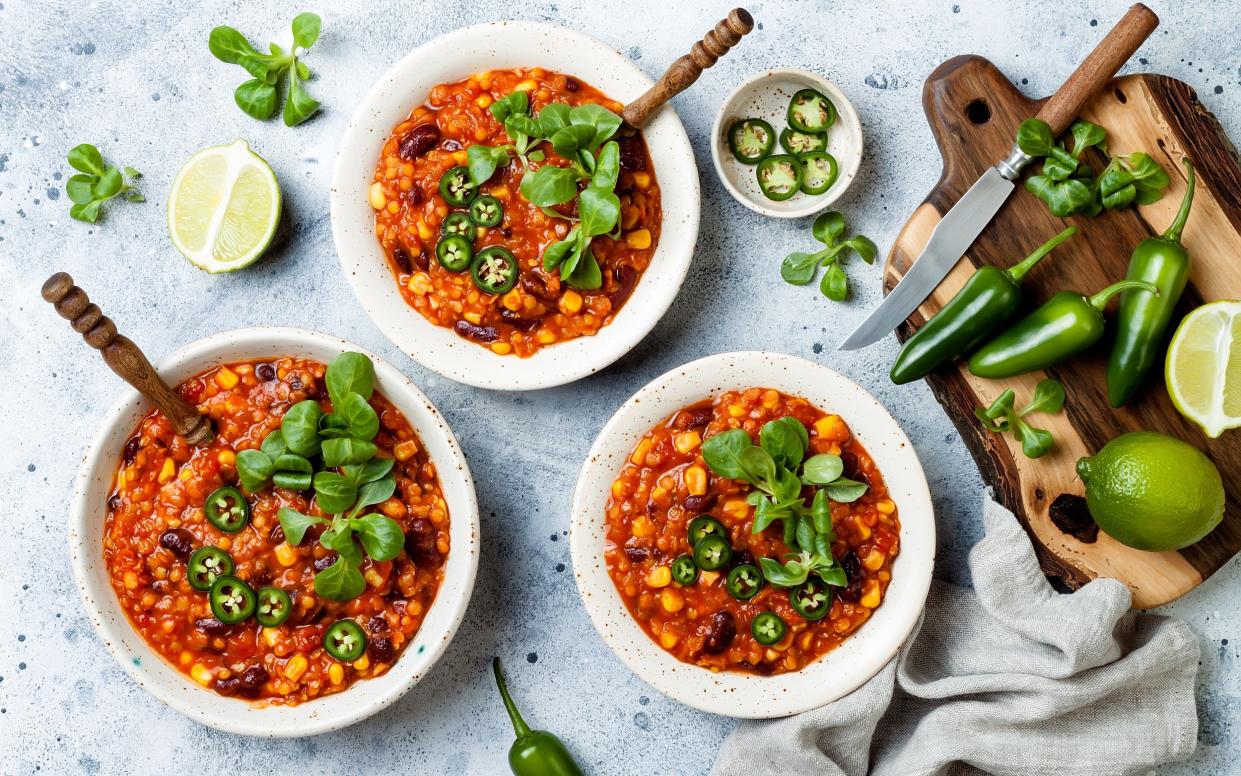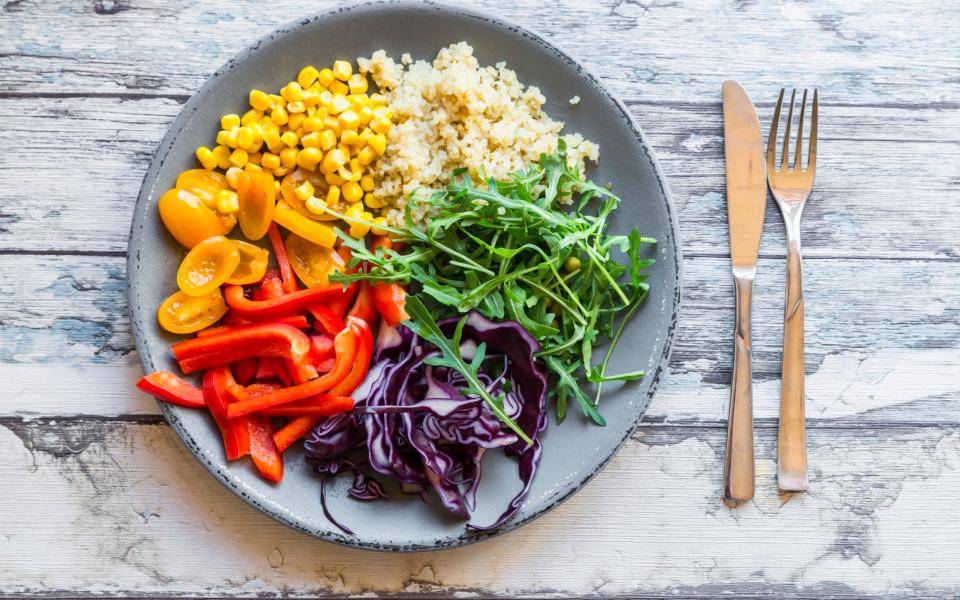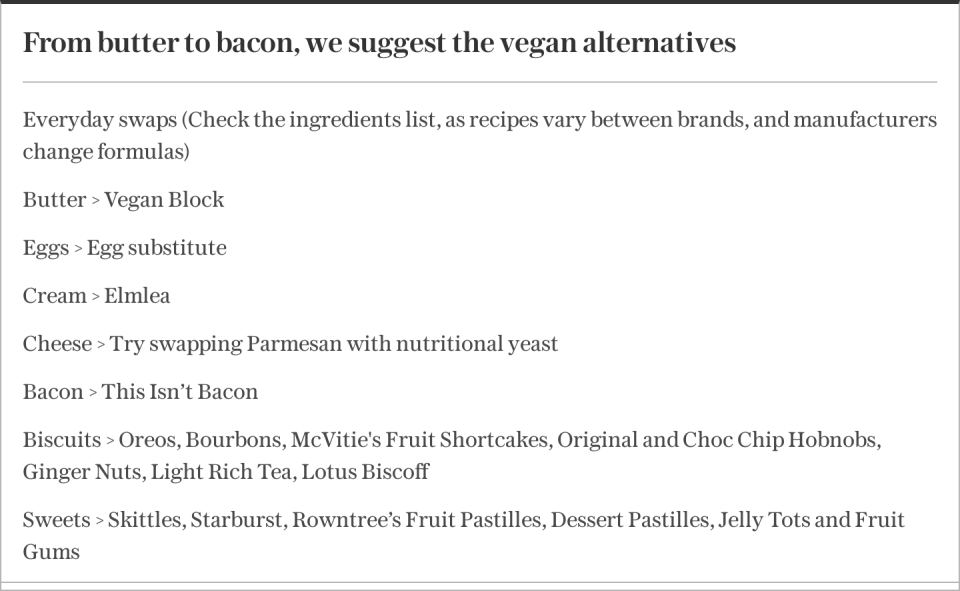How going vegan for a month could help your heart health

Are you appalled by the very idea of swapping your full English breakfast for scrambled tofu and ‘facon’? If so, you might find this hard to digest: new research has added to the mountain of evidence that suggests a plant-based diet – aka vegan – helps you live a longer, healthier life.
Scientists at the prestigious Stanford Medicine in the US recently set out to learn what health benefits might result after switching from an omnivorous to a vegan diet To prevent genetic factors influencing the results, they used 22 sets of healthy twins; one from each pair was matched with either a vegan or an omnivorous diet, which they consumed for eight weeks.
At the end of the study, the results were clear. The twins on the vegan diet had improved their cardiovascular health, with the biggest benefits seen after just a month. They had “significantly” lower levels than the omnivorous twins of both ‘bad’ LDL cholesterol and insulin (high levels of insulin are a risk factor for diabetes). The vegans also had lower body weight. “Based on these results and thinking about longevity, most of us would benefit from going to a more plant-based diet,” said Professor Christopher Gardner, who led the study.
Meat enthusiasts might want to look away now because the Stanford findings chime with a wealth of other evidence suggesting a vegan diet is good for you. Last year, scientists at Madrid’s Research Institute on Food and Health Sciences linked vegan diets to lower blood pressure. Other recent studies have found that vegan diets are effective for everything from weight management to reducing inflammation (which is linked to an array of chronic health conditions).
The mechanisms behind these benefits aren’t fully understood, and many possible factors are involved, says Bridget Benelam, a nutrition scientist at the British Nutrition Foundation.
“Following a healthy vegan diet will provide plenty of fruit, vegetables, pulses, grains, nuts and seeds, be high in fibre and low in saturated fat,” she says. “These are all known to have beneficial impacts on heart-related risk factors. They are also likely to have a lower calorie density, encouraging lower calorie intakes.” Vegan diets are also associated with lower body weight, which may explain some of the benefits.
All of these benefits hinge, of course, on eating a healthy vegan diet. A bag of crisps might count as plant-based, but won’t protect your arteries. So, what’s really involved in going vegan? Does it mean the end of joyful eating? And how can you make it bearable?
What exactly is a vegan diet?
It’s worth ripping off the sticking plaster of bad news at this point. A strictly vegan diet involves giving up all animal products including meat, seafood, eggs, dairy and honey.
Some types of beer, wine and cider don’t count as vegan due to products used in the filtration process, such as isinglass (made from fish bladders), gelatine (animal bones, cartilage and skin) and casein (a milk by-product). If you’re motivated by the health benefits of veganism rather than animal welfare concerns, this might not concern you too much – although booze isn’t a health food, obviously.
But if you still associate veganism with thin militant hippies surviving on lentils and soy milk, you need to adjust your mindset before going plant-based.

“There’s never been a better time to be vegan,” says Robbie Lockie, co-founder of www.plantbasednews.org, an information website for vegans. “Waitrose has an entire vegan aisle with loads of wonderful products; it’s phenomenal,” he says. From faux fromage and mock meat to dairy-free yoghurt, milk and butter, as well as plant-based cakes and pastries, there are vegan alternatives for almost every food.
While they’re convenient, most of these products are ultra-processed food (UPF), now widely regarded to be unhealthy, probably addictive and possibly a major cause of obesity. So, if you reserve these types of foods for eating now and then, how hard is it to follow a vegan diet?

Ease into it
Going cold turkey on animal products could mean you give up veganism before you’ve really started on your vegan diet, says Lockie. For the best chance of sticking to it, start gradually, suggests Lockie, who was a meat fanatic before going plant-based for health reasons 12 years ago.
“I grew up in Zimbabwe and meat was like breathing the air,” he says. He started by cutting out dairy. “Occasionally I’d sneak in bits of cheese,” he admits, “but then I slowly started to swap things out and found vegan replacements for all the food I love.”
Katy Beskow is author of 11 vegan cookbooks. She recommends taking “little steps” along the plant-based road. “You could start with one meal a day, maybe breakfast, and veganise it by replacing your normal yoghurt for soya yoghurt,” she says.
Dr Toni Vernelli, international head of policy and communications at Veganuary, suggests veganising dishes you really love. “Family favourites such as cottage pie, lasagne, chilli and spaghetti bolognaise can easily be veganised by swapping meat for lentils, mashed tofu or ready-made vegan mince,” she says. Dishes like mashed potatoes and creamy sauces can easily be adapted with plant milk and vegan butter or olive oil.
How to shop before you start
The first step is ensuring you have the right food to hand before you start your vegan adventure. Beskow suggests looking for ‘accidentally vegan’ products – ie, they’re not deliberately manufactured to be plant-based; they just happen to be. In fact, you probably already have many of them in your cupboard.
These include dried pasta (mostly made without egg), most bread, crumpets and bagels. Rice noodles are vegan, so ask for the latter instead of egg noodles when ordering takeaways. Pot noodles – even the chicken and beef flavoured ones – are, surprisingly, vegan. Spreads including nut butters, Marmite and jam are typically made without gelatine. Baked beans (the original recipe) are vegan, as is Bisto gravy (Original, Reduced Salt, Vegetable, and Onion versions).
You can also eat Bird’s custard; Jus-Rol puff and shortcrust pastry, as well as dark chocolate. (See www.veganuary.com for a full list of accidentally vegan products.) Be sure to check the label first, though, as recipe formulas regularly change.
When it comes to vegan substitutes for basics like milk, butter, cream and cheese, the quality has improved dramatically in recent years, but some products are definitely better than others.
“It’s important to try a variety of plant-based products to find one you like,” Dr Vernelli says. “People often try one type of plant milk, for example, and if they don’t like it, write off the whole category. But there are so many different variations and they all taste and act very differently.”
Finally, instead of focusing on what you have to exclude from your diet as a vegan, celebrate what you can eat and discover the possibilities. Philip Khoury, head pastry chef at Harrods, has revolutionised vegan baking in his book aimed at home cooks, A New Way To Bake.
Khoury used his knowledge of the chemistry of baking along with his pastry skills to reformulate cake, biscuit, tart and pudding recipes so that eggs and butter are unnecessary. Instead of swapping these baking staples for manufactured vegan substitutes, he deploys olive oil, baking powder, cornflour and even sweet potato in recipes for bakes and desserts, from fudge cake and pastries through to gelato and pies.
He says vegan bakes can taste even better than non-vegan versions. “You can have bolder, cleaner and more vibrant flavours.” he says. “Within our pantries, we have so many plant-based ingredients with incredible functionality, that we’re just not fully using.”
If you don’t fancy making vegan sweet treats from scratch, though, you don’t have to miss out. Most high street bakeries and cafés have sweet vegan options these days. To find them, use the Happy Cow app or visit www.happycow.net/mobile. It’s an amazing resource that lists all restaurants, cafes and shops around the world that have vegan options.
Make sure you get the nutrients you need
Vegans need to be careful to cover their nutritional bases, as well as bear in mind that plant-based doesn’t always mean healthy. “Including a lot of products that are high in saturated fat, salt or sugar will affect the healthiness of your diet, so it’s important to check labels when you’re choosing processed vegan foods,” Benelam says.
Generally, vitamin B12 is only found in foods from animal sources, so you need to make sure you’re getting enough. “This can be through supplements or fortified foods, such as breakfast cereals or yeast extract,” she says.
Iron, calcium and iodine can also be tricky to get from a plant-only diet. These can be provided by a balanced vegan diet, including fortified foods, but supplements might be a good choice to make sure you don’t become deficient.
Once you’ve ticked the important health boxes, it’s vital not to let perfectionism be the enemy of the good, says Dr Vernelli. “If you give in to temptation or accidentally eat something non-vegan, don’t sweat it,” she says. “Chalk it up to experience and carry on. After all, you’re making these changes to feel better, not beat yourself up for being human.”

